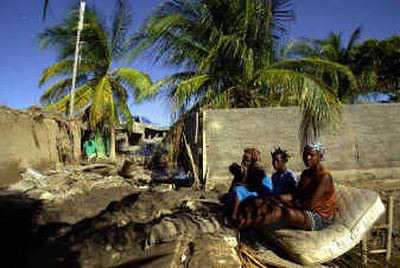Haitians cite storm’s damage in call to stop deportations

After Hurricane Mitch struck in 1998, the United States granted a temporary reprieve to Nicaraguans and Hondurans who faced deportation to their storm-ravaged countries.
Then, in 2001, when an earthquake shook El Salvador, that status was extended to them.
Citizens from several African countries, who instead have faced political upheaval, have been able to stay in the United States as well.
Now, Haitian Americans and their advocates say it’s their turn.
“With everything that (that country) is struggling with, they don’t need a planeload of 500 more people coming back,” said Christina Leddin, an immigration specialist with the Amigos Center, which operates in Southwest Florida.
Each week, the United States sends foreigners — some here legally and others not — back to their home countries. Expired student or work permits may be the cause in some cases, while in others, people entered the United States without the proper documentation.
But U.S. immigration officials can make an exception. It’s called TPS, or “temporary protected status.”
TPS continues to be in effect for Nicaraguans and Hondurans.
Haitians say it should be granted to them because of the death and destruction caused by then-Tropical Storm Jeanne, which struck the country two weeks ago, leaving nearly 2,000 dead and more than 800 missing. The storm has devastated Gonaives, a port city of 250,000, which is the center for Haiti’s food production.
“It was bad before,” said Haitian native Nancy Doxy, 36, a Cape Coral resident. “I can imagine it’s even worse now due to the situation that Jeanne caused.”
TPS wouldn’t open the door for any more Haitians to come to the United States, because the status only affects people who are already here. Advocates say it would give Haitians the opportunities to get jobs, go to school and to contribute to the community without the imminent fear of deportation.
Leddin, who has many Haitian clients, said she’s watched as people from other countries have been given this temporary protection. She wonders why Haitians are still waiting.
“It’s time to put Haiti first and give them something that’s going to make a difference,” Leddin said. “(TPS) says we realize things are so bad in the country right now … and it allows people to stay here while things improve back in their country.”
Haiti has been plagued by political unrest for years. The latest bout occurred in February when rebels ousted then President Jean-Bertrand Aristide, a former priest, who was accused of charges ranging from drug trafficking to stealing from the government. At least 300 Haitians were killed in the revolt, which then sparked an American-led intervention. The United Nations has since taken over the mission to restore order.
Jeanne is the most recent natural disaster to plague Haiti. In May, flooding along the border with the Dominican Republic caused the death of more than 1,000 Haitians.
Despite the turmoil and destruction, the United States has never given protected status to Haitians.
Federal immigration policies that appear to favor other nationalities have bred ill will among the 15,000-plus Haitians in Southwest Florida such as Doxy, who came here in 1984 and became a citizen six years later.
“I’m not going to go as far as to say it’s racism, but it doesn’t look good,” Doxy said.
Despite growing pressure from churches, immigrant-rights groups and Haitian-American organizations, the deportation policy remains unchanged, said Nina Pruneda, a spokeswoman for the Department of Homeland Security.
“Haitians ordered removed from the United States will continue to be removed,” Pruneda said.
In the week after Jeanne wreaked havoc, Pruneda confirmed that 17 Haitians were returned to the Caribbean country.